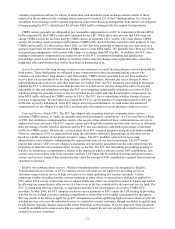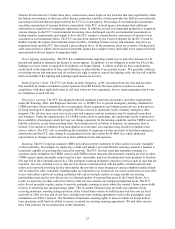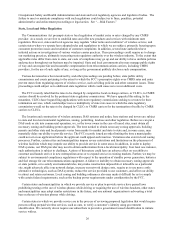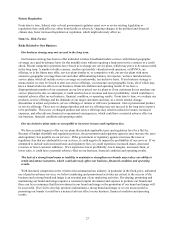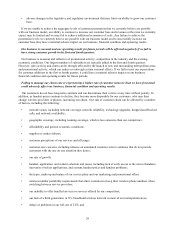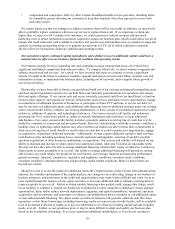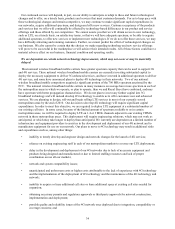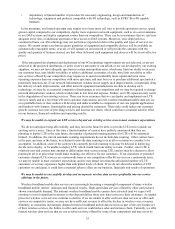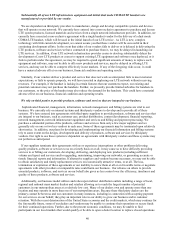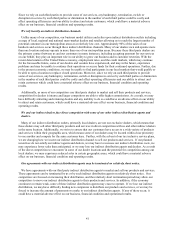Metro PCS 2009 Annual Report Download - page 43
Download and view the complete annual report
Please find page 43 of the 2009 Metro PCS annual report below. You can navigate through the pages in the report by either clicking on the pages listed below, or by using the keyword search tool below to find specific information within the annual report.31
generate sufficient cash from our operations, our credit ratings could be adversely affected, which would likely
increase our future borrowing costs and could affect our ability to access additional capital.
We face intense competition from other telecommunications providers and new entrants in the marketplace.
We compete directly in each of our markets with wireless, wireline, cable, satellite, Internet and other
communications service providers. Many of our current and prospective competitors are, or are affiliated with,
major companies that have better developed networks and support systems, substantially greater financial, technical,
personnel, marketing and lobbying resources and bargaining power than we have. Some have greater access to
capital, cash reserves, spectrum holdings, longer-established brands with name recognition, larger geographic
coverage areas, roaming coverage, third-party distribution, unique intellectual property, exclusive distributorship
arrangements for certain popular brands of handsets, applications and content and a larger market share, more
widespread service areas, and more advanced technology than we have, all of which may affect our ability to
compete successfully. These competitors often have established relationships with a larger base of current and
potential customers and, due to size and bargaining power, may obtain discounts for features, equipment, handset
and services. Further, as the growth in the post-pay sector of the wireless industry continues to decrease, many of
these same larger, nationwide competitors with ample resources are either, directly or indirectly, through resellers,
entering into the paid-in-advance section of the wireless industry, significantly increasing competition and pushing
down revenues with aggressive sales and marketing campaigns. These advantages may allow our competitors to
offer services (including, handset subsidies, higher commissions to distributors and dealers and greater bundled
features and content) we do not and cannot offer, offer lower prices, market to broader customer segments, and offer
service over larger geographic areas, which may have a material adverse effect on our business, financial condition
and operating results. Further concentration of the market may result in our having one or two competitors with
such market power that our ability to compete may be adversely affected.
Some of our competitors have, or may in the future, take advantage of governmental loan, grant or credit
programs, which may allow them to offer services for lower prices, have lower costs, or provide service in areas that
may be uneconomic for us to serve without taking advantage of such programs. If we choose not to, or are unable
to, participate in such governmental programs and our competitors participate, it could have a material adverse
effect on our business, financial condition, and operating results.
We may face additional competition from existing or new entrants as a result of future FCC auctions of
spectrum and/or through legislative change or actions by the FCC allowing the development of new products
and services by existing competitors and allowing other non-telecommunications businesses to enter the
industry.
The FCC in the past has taken, and may in the future take, steps to make additional spectrum available for
wireless services in each of our metropolitan areas. Any auction and licensing of new spectrum may result in new
competitors and/or allow existing competitors to acquire additional spectrum, which could allow them to offer
services that we may not be able to offer with the licenses we hold or to which we have access due to technological
or economic constraints. Also, the FCC has taken, and in the future may take, regulatory actions designed to
provide greater capacity and flexibility to other licensees, including our competitors, and could allow companies that
are not currently our competitors to offer competing products and services. In addition, some companies in non-
telecommunications businesses, including cable, energy companies and utility companies, also are expanding their
services to offer communications and broadband services. Moreover, some companies in non-regulated portions of
the telecommunications business, such as Internet search engine companies, are offering products and services that
compete with our more highly regulated services. We cannot control most of these factors and the continuing
consolidation and resulting economies of scale and access to greater resources and additional competition could
result in greater product, service, pricing and cost disadvantages to us which could have a material adverse effect on
our business, financial condition and operating results.
Recent competitive pressures have caused us to change our service plans, which may prove to be unsuccessful in
the long term. A number of other carriers, resellers and MVNOs are offering, or in the future may offer, service
plans similar to, or competitive with, our service plans with more extensive geographic coverage than ours and other
differentiating features. In response to increasing competition in the pre-paid market, we have introduced new
service plans, which all include service coverage on a nationwide, tax-inclusive basis. Our new service plans,
however, may not succeed in the long term or we may need to change our business strategy. If we have a
disproportionate number of our customers on our lower priced service plans or if our customers do not purchase our
service plans in the mix we anticipate, it could result in lower revenues and lower profitability, which could have a


